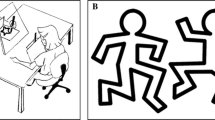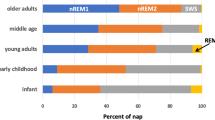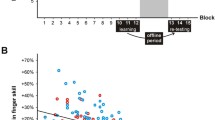Abstract
Sleep benefits memory consolidation across a variety of domains in young adults. However, while declarative memories benefit from sleep in young children, such improvements are not consistently seen for procedural skill learning. Here we examined whether performance improvements on a procedural task, although not immediately observed, are evident after a longer delay when augmented by overnight sleep (24 h after learning). We trained 47 children, aged 33–71 months, on a serial reaction time task and, using a within-subject design, evaluated performance at three time points: immediately after learning, after a daytime nap (nap condition) or equivalent wake opportunity (wake condition), and 24 h after learning. Consistent with previous studies, performance improvements following the nap did not differ from performance improvements following an equivalent interval spent awake. However, significant benefits of the nap were found when performance was assessed 24 h after learning. This research demonstrates that motor skill learning is benefited by sleep, but that this benefit is only evident after an extended period of time.





Similar content being viewed by others
References
Acebo C, Sadeh A, Seifer R, Tzischinsky O, Hafer A, Carskadon MA (2005) Sleep/wake patterns derived from activity monitoring and maternal report for healthy 1-to 5-year-old children. Sleep 28(12):1568
Backhaus J, Junghanns K (2006) Daytime naps improve procedural motor memory. Sleep Med 7(6):508–512
Backhaus J, Hoeckesfeld R, Born J, Hohagen F, Junghanns K (2008) Immediate as well as delayed post learning sleep but not wakefulness enhances declarative memory consolidation in children. Neurobiol Learn Mem 89(1):76–80
Benington JH, Frank MG (2003) Cellular and molecular connections between sleep and synaptic plasticity. Prog Neurobiol 69(2):71–101
Casey BJ, Giedd JN, Thomas KM (2000) Structural and functional brain development and its relation to cognitive development. Biol Psychol 54(1–3):241–257
Caviness VS, Kennedy DN, Richelme C, Rademacher J, Filipek PA (1996) The human brain age 7–11 years: a volumetric analysis based on magnetic resonance images. Cereb Cortex 6(5):726–736
Deregnaucourt S, Mitra PP, Feher O, Pytte C, Tchernichovski O (2005) How sleep affects the developmental learning of bird song. Nature 433(7027):710–716
Fischer S, Hallschmid M, Elsner AL, Born J (2002) Sleep forms memory for finger skills. Proc Natl Acad Sci USA 99(18):11987–11991
Fischer S, Drosopoulos S, Tsen J, Born J (2006) Implicit learning–explicit knowing: a role for sleep in memory system interaction. J Cogn Neurosci 18(3):311–319
Fischer S, Wilhelm I, Born J (2007) Developmental differences in sleep’s role for implicit off-line learning: comparing children with adults. J Cogn Neurosci 19(2):214–227
Folstein MF, Luria R (1973) Reliability, validity, and clinical application of the visual analogue mood scale. Psychol Med 3(04):479–486
Giedd JN, Snell JW, Lange N, Rajapakse JC, Casey BJ, Kozuch PL, Rapoport JL (1996) Quantitative magnetic resonance imaging of human brain development: ages 4–18. Cereb Cortex 6(4):551–559
Giedd JN, Blumenthal J, Jeffries NO, Castellanos FX, Liu H, Zijdenbos A, Rapoport JL (1999) Brain development during childhood and adolescence: a longitudinal MRI study. Nat Neurosci 2(10):861–863
Graves L, Pack A, Abel T (2001) Sleep and memory: a molecular perspective. Trends Neurosci 24(4):237–243
Haywood K, Getchell N (2009) Lifespan motor development, 5th edn. Human Kinetics, Champaign
Howard DV, Howard JH (2001) When it does hurt to try: adult age differences in the effects of instructions on implicit pattern learning. Psychon Bull Rev 8(4):798–805
Huttenlocher P (1979) Synaptic density in human frontal cortex—developmental changes and effects of aging. Brain Res 163(2):195–205
Iglowstein I, Jenni OG, Molinari L, Largo RH (2003) Sleep duration from infancy to adolescence: reference values and generational trends. Pediatrics 111(2):302–307
Kurdziel L, Duclos K, Spencer RMC (2013) Sleep spindles in midday naps enhance learning in preschool children. Proc Natl Acad Sci USA 110(43):17267–17272
Maldonado CC, Bentley AJ, Mitchell D (2004) A pictorial sleepiness scale based on cartoon faces. Sleep 27(3):541–548
Montgomery-Downs HE, O’Brien LM, Gulliver TE, Gozal D (2006) Polysomnographic characteristics in normal preschool and early school-aged children. Pediatrics 117(3):741–753
Nissen MJ, Bullemer P (1987) Attentional requirements of learning: evidence from performance measures. Cogn Psychol 19(1):1–32
Pace-Schott EF, Spencer RMC (2013) Age-related changes in consolidation of perceptual and muscle-based learning of motor skills. Front Aging Neurosci 5(83):1–7
Prehn-Kristensen A, Göder R, Chirobeja S, Breßmann I, Ferstl R, Baving L (2009) Sleep in children enhances preferentially emotional declarative but not procedural memories. J Exp Child Psychol 104(1):132–139
Rapoport JL, Gogtay N (2008) Brain neuroplasticity in healthy, hyperactive and psychotic children: insights from neuroimaging. Neuropsychopharmacology 33(1):181–197
Rauchs G, Bertran F, Guillery-Girard B, Desgranges B, Kerrouche N, Denise P, Eustache F (2004) Consolidation of strictly episodic memories mainly requires rapid eye movement sleep. Sleep 27(3):395–401
Robertson EM, Pascual-Leone A, Press DZ (2004) Awareness modifies the skill-learning benefits of sleep. Curr Biol 14(3):208–212
Savion-Lemieux T, Bailey JA, Penhune VB (2009) Developmental contributions to motor sequence learning. Exp Brain Res 195(2):293–306
Song S, Howard JH, Howard DV (2007) Sleep does not benefit probabilistic motor sequence learning. J Neurosci 27(46):12475–12483
Spencer RMC, Sunm M, Ivry RB (2006) Sleep-dependent consolidation of contextual learning. Curr Biol 16(10):1001–1005
Spencer RMC, Gouw AM, Ivry RB (2007) Age-related decline of sleep-dependent consolidation. Learning & Memory 14(7):480–484
Stickgold R (2005) Sleep-dependent memory consolidation. Nature 437(7063):1272–1278
Stickgold R, Walker MP (2007) Sleep-dependent memory consolidation and reconsolidation. Sleep Med 8(4):331–343
Thomas KM, Nelson CA (2001) Serial reaction time learning in preschool and school-age children. J Exp Child Psychol 79:364–387
Uematsu A, Matsui M, Tanaka C, Takahashi T, Noguchi K, Suzuki M, Nishijo H (2012) Developmental trajectories of amygdala and hippocampus from infancy to early adulthood in healthy individuals. PLoS ONE 7(10):1–10
Walker MP, Stickgold R (2004) Sleep-dependent learning and memory consolidation. Neuron 44(1):121–133
Walker MP, Brakefield T, Morgan A, Hobson JA, Stickgold R (2002) Practice with sleep makes perfect: sleep-dependent motor skill learning. Neuron 35(1):205–211
Walker MP, Stickgold R, Alsop D, Gaab N, Schlaug G (2005) Sleep-dependent motor memory plasticity in the human brain. Neuroscience 133(4):911–917
Weissbluth M (1995) Naps in children: 6 months–7 years. Sleep 18(2):82–87
Wilhelm I, Diekelmann S, Born J (2008) Sleep in children improves memory performance on declarative but not procedural tasks. Learn Mem 15(5):373–377
Wilhelm I, Metzkow-Mészàros M, Knapp S, Born J (2012) Sleep-dependent consolidation of procedural motor memories in children and adults: the pre-sleep level of performance matters: sleep-dependent consolidation of motor memories. Dev Sci 15(4):506–515
Wilhelm I, Rose M, Imhof KI, Rasch B, Büchel C, Born J (2013) The sleeping child outplays the adult’s capacity to convert implicit into explicit knowledge. Nat Neurosci 16(4):391–393
Wilson JK, Baran B, Pace-Schott EF, Ivry RB, Spencer RMC (2012) Sleep modulates word-pair learning but not motor sequence learning in healthy older adults. Neurobiol Aging 33(5):991–1000
Wozniak RH (1999) Classics in the history of psychology. Thoemmes Press, Bristol
Yang G, Lai CSW, Cichon J, Ma L, Li W, Gan WB (2014) Sleep promotes branch-specific formation of dendritic spines after learning. Science 344(6188):1173–1178
Acknowledgments
The authors would like to thank Tim Miller for programming the iPad task. This work was supported in part by National Institute of Health Grant R01 HL111695 (to R.M.C.S.).
Author information
Authors and Affiliations
Corresponding author
Rights and permissions
About this article
Cite this article
Desrochers, P.C., Kurdziel, L.B.F. & Spencer, R.M.C. Delayed benefit of naps on motor learning in preschool children. Exp Brain Res 234, 763–772 (2016). https://doi.org/10.1007/s00221-015-4506-3
Received:
Accepted:
Published:
Issue Date:
DOI: https://doi.org/10.1007/s00221-015-4506-3




